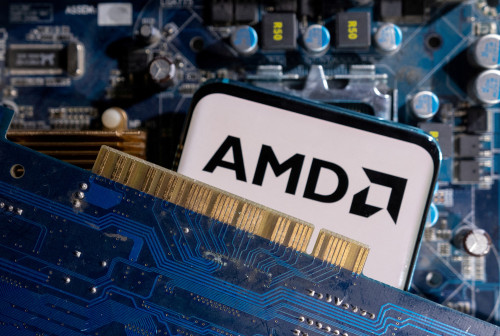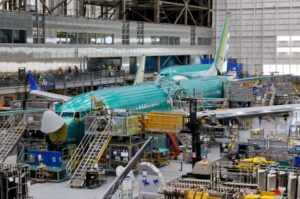By Arsheeya Bajwa, Max A. Cherney
(Reuters) -Advanced Micro Devices forecast second-quarter revenue above Wall Street estimates on Tuesday, in part because of the global thirst for its artificial-intelligence chips even as trade tensions clouded its ability to sell into the Chinese market.
Shares of the Santa Clara, California-based company were up 4.7% in extended trading.
Due to an $800 million charge from new U.S. curbs on chip exports to China, AMD forecast adjusted gross margin of 43%, which represents an 11 percentage-point drop excluding the charge.
The optimistic forecast from AMD could help reinforce investor confidence in its ability to compete against Nvidia, after concerns around a trailing position in the lucrative AI market had sent its shares down more than 17% this year.
Demand remains robust for its advanced processors that power complex AI systems for Microsoft, Meta Platforms and other customers, with cloud giants reinforcing hefty spending plans for building AI infrastructure.
The company expects revenue of about $7.4 billion for the second quarter, plus or minus $300 million, compared with analysts’ average estimate of $7.25 billion, according to data compiled by LSEG.
In February, the company steered away from a longstanding practice of giving a specific sales forecast for its AI chips, but CEO Lisa Su had said AMD expects “tens of billions” of dollars in sales “in the next couple of years.”
AMD reported first-quarter net profit of 96 cents a share, adjusted for stock compensation among other things. Analysts had expected adjusted earnings of 94 cents a share. The company recorded revenue of $7.44 billion, beating estimates of $7.13 billion.
“We delivered an outstanding start to 2025 as year-over-year growth accelerated for the fourth consecutive quarter driven by strength in our core businesses and expanding data center and AI momentum,” Su said in a statement.
(Reporting by Arsheeya Bajwa in Bengaluru and Max A. Cherney in San Francisco; Editing by Alan Barona and Matthew Lewis)




